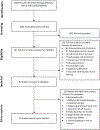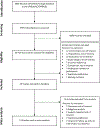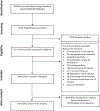Systematic Review for the 2017 ACC/AHA/AAPA/ABC/ACPM/AGS/APhA/ASH/ASPC/NMA/PCNA Guideline for the Prevention, Detection, Evaluation, and Management of High Blood Pressure in Adults: A Report of the American College of Cardiology/American Heart Association Task Force on Clinical Practice Guidelines
- PMID: 29146534
- PMCID: PMC8654280
- DOI: 10.1016/j.jacc.2017.11.004
Systematic Review for the 2017 ACC/AHA/AAPA/ABC/ACPM/AGS/APhA/ASH/ASPC/NMA/PCNA Guideline for the Prevention, Detection, Evaluation, and Management of High Blood Pressure in Adults: A Report of the American College of Cardiology/American Heart Association Task Force on Clinical Practice Guidelines
Erratum in
-
Correction.J Am Coll Cardiol. 2018 May 15;71(19):2272-2273. doi: 10.1016/j.jacc.2018.03.018. J Am Coll Cardiol. 2018. PMID: 29747839 No abstract available.
Abstract
Objective: To review the literature systematically and perform meta-analyses to address these questions: 1) Is there evidence that self-measured blood pressure (BP) without other augmentation is superior to office-based measurement of BP for achieving better BP control or for preventing adverse clinical outcomes that are related to elevated BP? 2) What is the optimal target for BP lowering during antihypertensive therapy in adults? 3) In adults with hypertension, how do various antihypertensive drug classes differ in their benefits and harms compared with each other as first-line therapy?
Methods: Electronic literature searches were performed by Doctor Evidence, a global medical evidence software and services company, across PubMed and EMBASE from 1966 to 2015 using key words and relevant subject headings for randomized controlled trials that met eligibility criteria defined for each question. We performed analyses using traditional frequentist statistical and Bayesian approaches, including random-effects Bayesian network meta-analyses.
Results: Our results suggest that: 1) There is a modest but significant improvement in systolic BP in randomized controlled trials of self-measured BP versus usual care at 6 but not 12 months, and for selected patients and their providers self-measured BP may be a helpful adjunct to routine office care. 2) systolic BP lowering to a target of <130 mm Hg may reduce the risk of several important outcomes including risk of myocardial infarction, stroke, heart failure, and major cardiovascular events. No class of medications (i.e., angiotensin-converting enzyme inhibitors, angiotensin-receptor blockers, calcium channel blockers, or beta blockers) was significantly better than thiazides and thiazide-like diuretics as a first-line therapy for any outcome.
Keywords: ACC/AHA Clinical Practice Guidelines; Evidence Review Committee; antihypertensive drug class; blood pressure; cardiovascular disease; home blood pressure monitoring; hypertension; meta-analysis; risk reduction; targets; treatment outcomes.
Copyright © 2018 American College of Cardiology Foundation and the American Heart Association, Inc. Published by Elsevier Inc. All rights reserved.
Figures



Comment in
-
Review: In hypertension, intensive BP goals reduce CV events; self vs office BP measures do not improve BP at 12 mo.Ann Intern Med. 2018 Sep 18;169(6):JC26. doi: 10.7326/ACPJC-2018-169-6-026. Ann Intern Med. 2018. PMID: 30242399 No abstract available.
References
-
- Committee on Standards for Developing Trustworthy Clinical Practice Guidelines, Institute of Medicine (U.S.). Clinical Practice Guidelines We Can Trust. Washington, DC: National Academies Press, 2011.
-
- Committee on Standards for Systematic Reviews of Comparative Effectiveness Research, Institute of Medicine (U.S.). Finding What Works in Health Care: Standards for Systematic Reviews. Washington, DC: National Academies Press, 2011. - PubMed
-
- ACCF/AHA Task Force on Practice Guidelines. Methodology Manual and Policies From the ACCF/AHA Task Force on Practice Guidelines. American College of Cardiology and American Heart Association. 2010. Available at: http://assets.cardiosource.com/Methodology_Manual_for_ACC_AHA_Writing_Co.... Accessed September 15, 2017.
-
- Halperin JL, Levine GN, Al-Khatib SM, et al. Further evolution of the ACC/AHA clinical practice guideline recommendation classification system: a report of the American College of Cardiology/American Heart Association Task Force on Clinical Practice Guidelines. J Am Coll Cardiol. 2016;67:1572–4. - PubMed
-
- Jacobs AK, Kushner FG, Ettinger SM, et al. ACCF/AHA clinical practice guideline methodology summit report: a report of the American College of Cardiology Foundation/American Heart Association Task Force on Practice Guidelines. J Am Coll Cardiol. 2013;61:213–65. - PubMed
Publication types
MeSH terms
Substances
Grants and funding
LinkOut - more resources
Full Text Sources
Other Literature Sources
Medical
Research Materials
Miscellaneous

